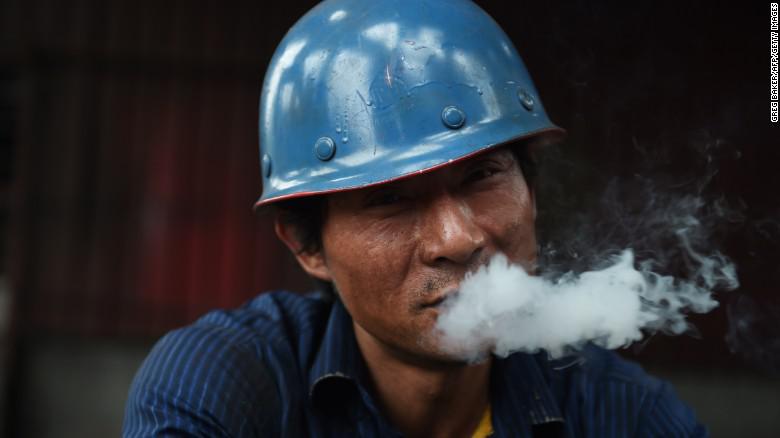
A tough new ban on smoking indoor was carried out across the Chinese capital Monday, with lighting up now prohibited in all offices, shopping malls, restaurants, bars and airports. Many outdoor public places such as the areas outside kindergartens and hospitals will also be required to be smoke-free.
Businesses and institutions that break the law will face fines of up to 10,000 yuan ($1,600). Bernhard Schwartländer, the World Health Organization (WHO) representative in Beijing, says it's a "major advance" in tobacco control in China, where more cigarettes are smoked than anywhere else in the world.
It's not the first time Beijing has tried to solve its smoking problem -- a previous ban launched in 2008 was widely ignored. However, unlike previous efforts, this law has teeth. Individuals must pay 200 yuan ($32) and businesses risk a penalty of up to 10,000 yuan ($1,600). Anyone who breaks the law three times will find themselves named and shamed on a government website.
China is home to some 300 million smokers and some four million live in Beijing. More than one in every three cigarettes in the world is smoked in China. And those cigarettes are cheap -- as little as $1.50 for a popular brand like Zhongnanhai.
Smoking is a handy icebreaker in China, a way to greet someone and few interactions aren't made easier by offering a cigarette. While the new ban will limit tobacco advertising, it might already be too late for the next generation. In 2013, a WHO survey found that among five to six year old children, almost nine in ten can recognize at least one brand of cigarettes and one in five expect to be smokers when they grow up.
Some 45% of men smoke daily, according to 2013 figures, compared with just 2.1% of women -- this means that Chinese women endure some of the highest rates of exposure to second hand smoke in the world. It's hoped that this army of female non-smokers might prove to be a secret weapon in enforcing the new ban.
本时文内容由奇速英语国际教育研究院原创编写,禁止复制和任何商业用途,版权所有,侵权必究!
1.According to the new regulation, people are free to smoke in ______.
A all the offices
B shopping malls
C small restaurants
D their homes
解析:选D。D。细节理解题。根据第1段第1句的...with lighting up now prohibited in all offices, shopping malls, restaurants, bars and airports可知没有提到在家里戒烟的问题。
2.What was Bernhard Schwartländer’s attitude to the ban?
A Doubtful.
B Ironic.
C Interested.
D Supportive.
解析:选D。D。推理判断题。根据第2段第2句的...says it's a "major advance" in tobacco control in China可知他认为是一个巨大进步,因此他对北京戒烟是很支持的。
3.When the writer said “this law has teeth”, it really means ______.
A the law will be effective and powerful
B the law will bring in money
C he law will be ignored by many people
D the law causes some bad influences
解析:选A。A。推理判断题。从第3段第3句的Individuals must pay 200 yuan ($32) and businesses risk a penalty of up to 10,000 yuan ($1,600)可知该法律有明确的惩罚措施,会更加有效。
4.What caused people to smoke?
A The high price of cigarettes.
B The advertisement.
C The communicating habits.
D The bad weather.
解析:选C。C。细节理解题。根据第5段第1句的Smoking is a handy icebreaker in China, a way to greet someone and few interactions aren't made easier by offering a cigarette可知在中国要和其他人交流,递上烟会使得交流更加容易。
5.Why will female be a secret weapon in enforcing the new ban?
A Because they prefer to get the habit of smoking.
B Because they suffer from the second hand smoke.
C Because they never touch any brand of cigarettes.
D Because they want to put the new ban into practice.
解析:选B。B。细节理解题。根据文章最后一段第一句...this means that Chinese women endure some of the highest rates of exposure to second hand smoke in the world可知中国女士是二手烟最大的受害者,因此他们会帮助实施这项新的规定。